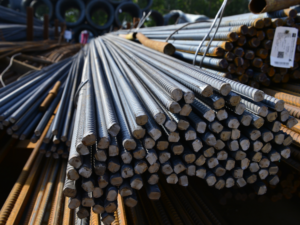The European Commission has opened an investigation to determine whether the current system of EU steel import safeguards should continue after its expiry on June 30, following requests from EU steelmaking nations, according to a Feb. 26 publication in the Official Journal of the EU.
Interested parties are being invited to submit their views to the EC within 15 days. A decision on whether the safeguards, based on a tariff-rate-quota system, may or not be continued will be made by June 30, the commission said. A mill source close to the investigation said that the decision is expected mid-May.
“Initiation of this investigation follows a duly substantiated request received from twelve EU Member States,” the EC said in a statement. “The Commission will in its investigation determine, in accordance with the requirements of EU and WTO rules, whether the safeguard measure continues to be necessary to prevent or remedy serious injury to the EU steel industry and whether the industry is adjusting.”
The member states consider that prolongation is necessary due to the “existence of continuous significant import pressure from third countries…the fact that global overcapacity remains at a very high level, that a large number of trade restrictive measures and trade defence measures by third countries continue being adopted, and that there are no elements suggesting that the US will be removing the Section 232 measures on steel,” according to the Official Journal statement.
After surging in 2017-18, certain steel imports into the EU have been restricted since July 2018 by a three-year import safeguards system involving quotas, introduced provisionally for its first six months and formalized in January 2019. The measure followed the imposition in March 2018 of the US’ Section 232 taxes on steel imports, which caused trade deviation, and the EC said it “aimed to prevent economic damage for EU steel producers, given the risk of further import increases linked, inter alia, to the introduction of trade restrictions by the US on steel products.”
Following introduction of the curbs, finished steel imports into the EU fell to 25.378 million mt in 2019, from 2018’s 29.279 million mt. Further falls came in 2020, when carbon steel imports fell 15.4% on-year to 20 million mt, almost a third lower than the 2018 peak, according to the European Steelmakers’ Association Eurofer’s website.
Surging prices
While steelmakers may support the continued existence of import curbs, steel consumer groups are typically against them as prices tend to be higher in a protected market environment.
The COVID-19 pandemic has also altered market dynamics in recent months. Following shutdowns amid a market slump last year, European steel mills see prospects for only a moderate increase in crude steel production in H1 2021, which is being outpaced by a demand recovery backed by government economic stimulus. A resultant tightness of material, particularly coil products, in EU markets has pushed some product prices to 13-year highs.
Current lower imports into the EU are seen partly due to China attracting greater import tonnages of third-country steel in recent months to feed its strong domestic demand. In past years a major steel exporter, China emerged last year as a substantial importer of semi-finished steel products. Rising international steel prices have also made imports less attractive in the EU market.
Some industry lawyers have recently argued that an extension to the EU steel import curbs would be unlawful under World Trade Organization rules. However, the commission said Feb. 26 that an extension of the safeguards system is legally permissible so long as the current investigation takes place first.
“In accordance with Article 19 of Regulation (EU) 2015/478 and Article 16 of Regulation (EU) 2015/755, the initial period of duration of a safeguard measure may be extended,” the EC said in its statement. “In order to establish whether such an extension is warranted, the Commission should carry out an investigation pursuant to Article 5 of Regulation (EU) 2015/478 and Article 3 of Regulation (EU) 2015/755 respectively.”
Member states to vote
The EC has issued questionnaires to EU steel producers to assess their economic situation, and will subsequently make a proposal to member states for a vote, it said in the statement. The proceeding will also include consultations with third country governments, it said.
Steelmakers in Turkey, a traditional supplier to the EU and whose steel output overtook Germany’s last year, are firmly against any extension of the safeguards.
Ugur Dalbeler, vice chairman of Turkish Steel Exporters’ Union (CIB), and also the CEO of major Turkish steelmaker Colakoglu, told S&P Global Platts Feb. 26 that he is hopeful that, following the review, the EC will terminate the existing safeguard measures without any extension.
“We have two reasons for our hopefulness: first of all the chairman of the EU commission said he is not intending to extend the measures,” Dalbeler said. “We are also thinking that the EU Commission will take into consideration our and some other countries’ panel requests at the WTO against protection measures as these measures are against the WTO rules….we believe the WTO could regain its actual function again after Trump,” he noted.
A commission spokeswoman did not immediately respond to a request for comment on the Turkish executive’s statement.
— Diana Kinch, Cenk Can and Laura Varriale






